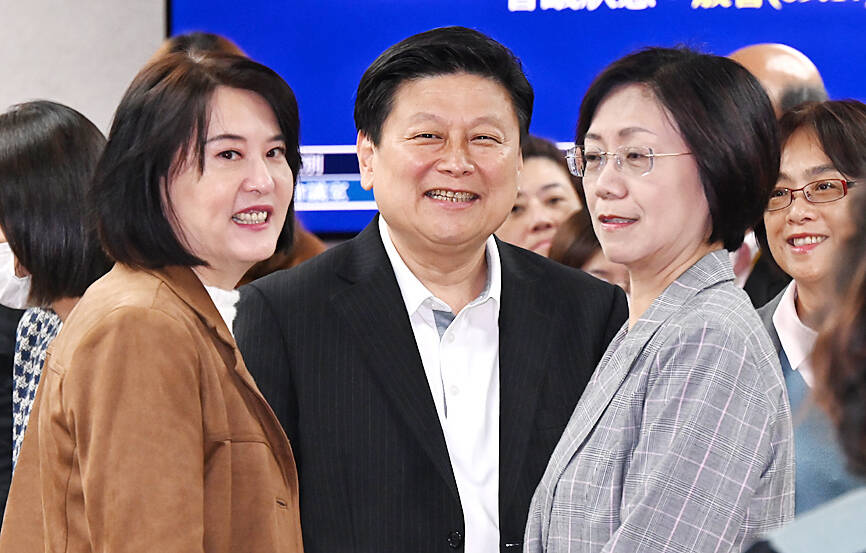Chinese Nationalist Party (KMT) lawmakers this week voiced concerns that a recent pledge by Taiwan Semiconductor Manufacturing Co (TSMC) to invest more in the US could threaten national security.
TSMC chairman C.C. Wei (魏哲家) and US President Donald Trump on Monday in Washington announced that the company is to invest an additional US$100 billion to expand its manufacturing operations in the US.
The pledge was for three semiconductor foundries, two advanced packaging facilities, and a research and development center.

Photo: Liu Hsin-de, Taipei Times
That would be on top of the US$65 billion TSMC has already committed to invest in three chip fabs, one of which has begun operations.
In an interview on Wednesday, KMT caucus whip Fu Kun-chi (傅?萁) said he was worried about what Taiwan would be left with if the ability to manufacture all the most advanced chips, including the 2-nanometer and 1.6-nanometer processes, were deployed in the US.
If a cross-strait war were to occur, the US would possess the most advanced and high-end chip manufacturing processes, leaving Taiwan with nothing to safeguard, Fu said.
Asked whether TSMC’s investment would minimize the impact on the US if China were to isolate or take Taiwan, Trump said it would make the US a “very big part” of the business.
“So it would have a big impact if something should happen with Taiwan,” he said.
KMT Legislator Wang Hung-wei (王鴻薇) on Wednesday said that the additional US$100 billion TSMC pledged to invest was more than the central government’s total budget for this year.
She said that while the investment seemed to put Trump at ease, the government has yet to explain to the public what the nation got in return.
There has been no explanation whether the investment would keep Taiwan exempt from trade wars or how Taiwan is to keep its semiconductor advantage, she said.
The Presidential Office on Tuesday promised that the government would ensure TSMC keeps its most advanced processes in Taiwan.
TSMC is expected to begin mass production of 2-nanometer chips in Taiwan in the second half of this year, followed by 1.6-nanometer chips next year. Its first factory in Arizona is using the 4-nanometer process.
KMT Chairman Eric Chu (朱立倫) said that the US would gain manufacturing skills and talent, while Taiwan would lose its semiconductor manufacturing and development base and talent.
He questioned why the Democratic Progressive Party was not willing to stand on the front lines as Taiwan faces an artificial intelligence war and trade war.
On Tuesday, the Ministry of Economic Affairs said TSMC’s investment plans took into account its long-term competitiveness and the demands of global clients.
The move would help strengthen the stability of the global semiconductor supply chain, the ministry said, expressing its “unwavering” stance to support Taiwan’s advanced industries to keep their roots in Taiwan, regardless of how they deploy globally.

The Grand Hotel Taipei on Saturday confirmed that its information system had been illegally accessed and expressed its deepest apologies for the concern it has caused its customers, adding that the issue is being investigated by the Ministry of Justice Investigation Bureau. The hotel said that on Tuesday last week, it had discovered an external illegal intrusion into its information system. An initial digital forensic investigation confirmed that parts of the system had been accessed, it said, adding that the possibility that some customer data were stolen and leaked could not be ruled out. The actual scope and content of the affected data

‘LIKE-MINDED PARTNER’: Tako van Popta said it would be inappropriate to delay signing the deal with Taiwan because of China, adding he would promote the issue Canadian senators have stressed Taiwan’s importance for international trade and expressed enthusiasm for ensuring the Taiwan-Canada trade cooperation framework agreement is implemented this year. Representative to Canada Harry Tseng (曾厚仁) in an interview with the Central News Agency (CNA) said he was increasingly uneasy about Ottawa’s delays in signing the agreement, especially as Ottawa has warmed toward Beijing. There are “no negotiations left. Not only [is it] initialed, we have three versions of the text ready: English, French and Mandarin,” Tseng said. “That tells you how close we are to the final signature.” Tseng said that he hoped Canadian Prime Minister Mark Carney

POSITIVE DEVELOPMENT: Japan and the US are expected to hold in-depth discussions on Taiwan-related issues during the meeting next month, Japanese sources said The holding of a Japan-US leaders’ meeting ahead of US President Donald Trump’s visit to China is positive news for Taiwan, former Japan-Taiwan Exchange Association representative Hiroyasu Izumi said yesterday. After the Liberal Democratic Party’s landslide victory in Japan’s House of Representatives election, Japanese Prime Minister Sanae Takaichi is scheduled to visit the US next month, where she is to meet with Trump ahead of the US president’s planned visit to China from March 31 to April 2 for a meeting with Chinese President Xi Jinping (習近平). Japan and the US are expected to hold in-depth discussions on Taiwan-related issues during the

President William Lai (賴清德) yesterday bestowed one of Taiwan’s highest honors on Saint Vincent and the Grenadines (SVG) Ambassador Andrea Clare Bowman in recognition of her contributions to bilateral ties. “By conferring the Order of Brilliant Star with Grand Cordon on Ambassador Bowman today, I want to sincerely thank her, on behalf of the Taiwanese people, for her outstanding contribution to deepening diplomatic ties between Taiwan and SVG,” Lai said at a ceremony held at the Presidential Office in Taipei. He noted that Bowman became SVG’s first ambassador to Taiwan in 2019 and